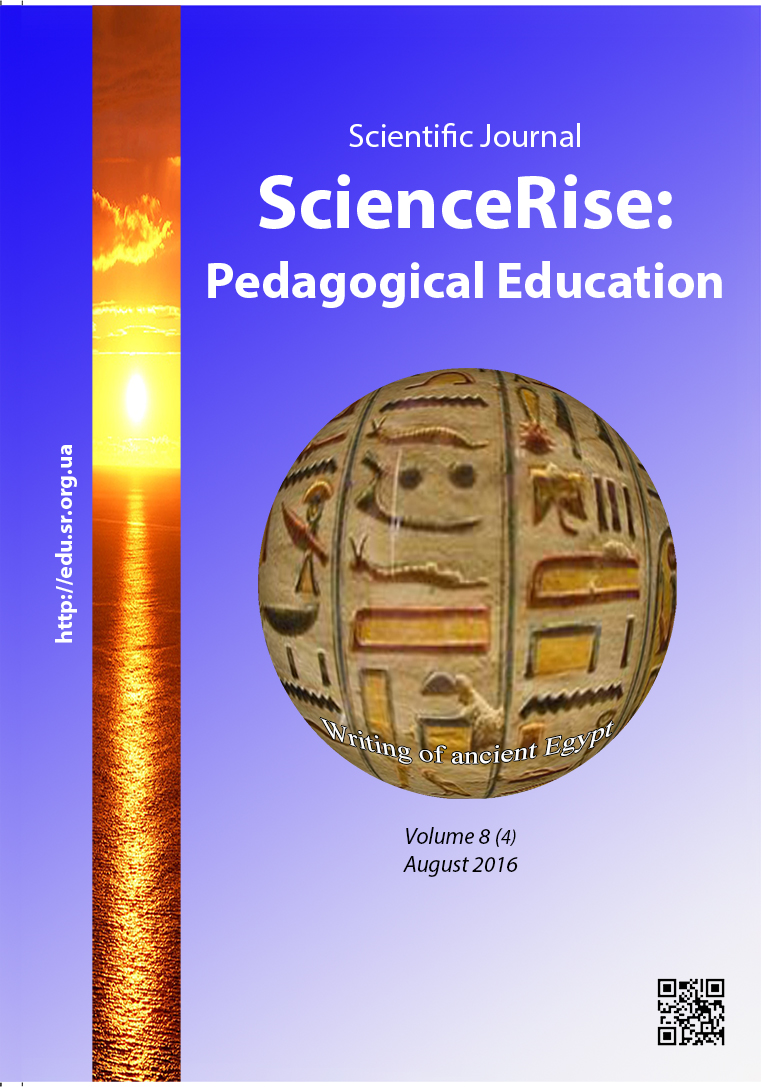Elaboration of technological card as a tool for increasing quality of quasiprofessional activity of the future teachers of informatics
DOI:
https://doi.org/10.15587/2519-4984.2016.76572Keywords:
training of teacher of informatics, learning process, organization of learning process, quasiprofessional activityAbstract
The speed of informatization of society and the spreading of means of information-communication technologies (ICT) condition the new approaches to organization of the learning process, especially in general educational institutions. Informatization of education favors the rise of effectiveness and flexibility of education, makes it modern and adapts it to the international standards. The modern educational technologies must be reflected, in the first turn, in the content component of disciplines, connected with methodology of teaching informatics, organization of practice at school, because different educational institutions have the different level of technical equipment. All this pushed us to the creation of technological card for student-practician, the future teacher of informatics. Using it in their quasiprofessional activity, students can systematize information, received at the first stages of practice, and analyze the state of technical and informational environment of educational institution.
The training of competent teacher of informatics, able to play the role of innovator, who can create the situation of expedient use of certain technology in the learning-upbringing process, favor the pupils’ preparation for the life in informational world according to the requirement of modern society, is a socially-important problem
References
- Morze, N., Barna, O., Kuzminska, O., Vember, V. (2016). In what way should modern computer science teachers improve their teaching skills to develop students’key and ic competence? Kyiv: Open educational e-environment of modern university, 189–200.
- Spivakovsky, O., Petukhova, L., Voropay, N. (2011). Do otsiniuvannia vzaiemodii u modeli «Vykladach-student-seredovyshche» [By evaluating the model of interaction «teacher- student environment»]. Science and education, 4, 401–405.
- Ovcharov, S. M. (2011). Aktual’ni problemy profesiinoi pidhotovky uchyteliv informatyky [Actual problems of professional training of Informatics teachers]. Pedagogical science, 2, 73–77.
- Bykov, V. Iu.; Kremen', V. G. (Ed.) (2008). Komp’iuteryzatsiia osvity [Computerization of Education]. Kyiv: Encyklopedija osvity Ukrai'ny, 410–412.
- Spirin, O. M. (2007). Teoretychni ta metodychni zasady profesiinoi pidhotovky maibutnikh uchyteliv informatyky za kredytno-modul’noiu systemoiu [Theoretical and methodological foundations of professional training of future teachers of computer science for credit-modular system]. Zhytomyr: Vyd-vo ZhDU im. I. Franka, 300.
- Rafalska, M. V. (2001). Formuvannia informatyvnykh kompetentnostei maibutnikh uchyteliv informatyky v protsesi navchannia metodiv obchyslen’ [Forming informative competence of future teachers of Informatics in the process of learning methods of calculation]. Kyiv, 225.
- Rubtsov, V. V. (2010). Psykholoho-pedahohycheskaia podhotovka uchytelia dlia «Novoi shkoly» [Psycho-pedagogical preparation of the teacher for the «New School»]. Psykholohycheskaia nauka y obrazovanye, 1, 5–12.
- Structure ІKT-competence of teachers. UNESCO Recommendation. Available at: http://iite.unesco.org/pics/publications/ru/files/3214694.pdf
- Shovkun, V. (2015). Pidgotovka maybutnogo vchitelya Informatiki do roboti v umovah suchasnogo informatsiyno-osvitnogo seredovischa shkoli [Training of future teacher of informatics to work in modern information and educational environment of school]. Information Technologies in Education, 23, 136–146.
- Dorohykh, R. V. (2011). Formuvannia profesiinykh yakostei maibutnikh uchyteliv u protsesi pedahohichnoi vzaiemodii [Formation of professional qualities of future teachers in the process of pedagogical interaction]. Kharkiv, 246.
Downloads
Published
How to Cite
Issue
Section
License
Copyright (c) 2016 Віталій Віталійович Шовкун

This work is licensed under a Creative Commons Attribution 4.0 International License.
Our journal abides by the Creative Commons CC BY copyright rights and permissions for open access journals.
Authors, who are published in this journal, agree to the following conditions:
1. The authors reserve the right to authorship of the work and pass the first publication right of this work to the journal under the terms of a Creative Commons CC BY, which allows others to freely distribute the published research with the obligatory reference to the authors of the original work and the first publication of the work in this journal.
2. The authors have the right to conclude separate supplement agreements that relate to non-exclusive work distribution in the form in which it has been published by the journal (for example, to upload the work to the online storage of the journal or publish it as part of a monograph), provided that the reference to the first publication of the work in this journal is included.







